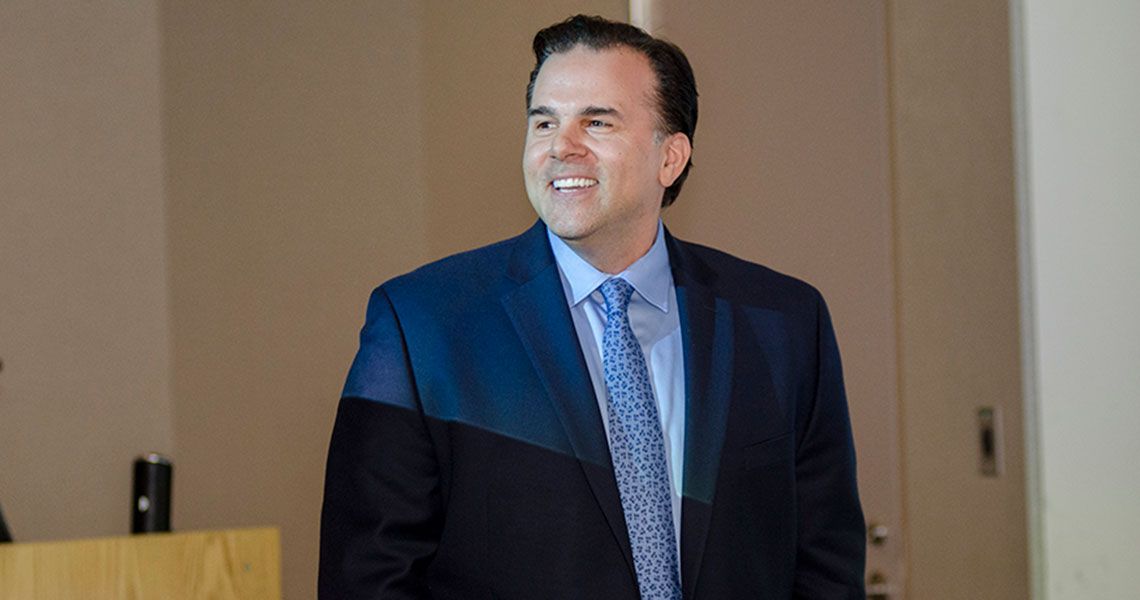Angelo E. Volandes, M.D., M.P.H., assistant professor of medicine at Harvard Medical School and hospitalist at Massachusetts General Hospital, had a patient named Helen Thompson. Thompson, an English professor and Walt Whitman scholar, had metastatic cancer. Her diagnosis was terminal, yet no one had had “the conversation” with her, Volandes recalled.
“She looked at me with those eyes, and many of you know what eyes I’m talking about. So, what could I do?” he asked at the inaugural Ronald I. Ottenberg, M.D., Memorial Lecture in mid-April. “I started having the conversation with her: ‘Professor, I think it’s time we have a forest-from-the-trees perspective. I think we need to know the risks and benefits of all these procedures, and I need to know where you are in your journey.”
The journey, he explained, includes understanding what treatments are really like — and whether the patient would prefer to pursue them or move forward with an end-of-life plan. It’s an approach that the lecture’s namesake, Ronald Ottenberg, M.D. ’59, B.A. ’56, would have supported.
Ottenberg, a long-time practitioner of orthopedic medicine, devoted himself to caring for his patients, said Danielle Doberman, M.D. ’00, M.P.H., assistant professor of medicine at the GW School of Medicine and Health Sciences. He even completed a living will for himself, she said, which he kept in the hospital with him during his final days.
“[Our team] used it to guide us as we and the family listened to his wishes,” she explained. “We were … struck by how much his family clearly loved him and how doggedly they supported him, embracing his efforts to balance quality-of-life goals with curative efforts.” The family continues to further Ottenberg’s objectives, now through the lecture series.
“This endowed lecture … speaks to their commitment to ensuring the voices of frail and fragile patients are always lifted up, heard, and incorporated into the medical practice of current and future physicians,” Doberman said.
In making sure Thompson’s voice was heard, Volandes, author of “The Conversation,” used a unique method: he took her on a tour of the intensive care unit (ICU), where she could “get a sense of the place,” he said. While they were there, she caught a glimpse of a code blue and medical professionals performing CPR on a patient.
“When we went back to her room, she looked at me and she said, ‘Words, words, words. Angelo, I understood every single word that you used before — CPR, comfort care — but I had no idea that’s what we were talking about. That’s not what it looks like on television,’” Volandes recalled.
Thompson’s words, he added, sparked an epiphany. “We doctors try to have conversations with our patients, but they’re thinking of the latest episode of ‘ER’ or ‘Grey’s Anatomy,’ where a miracle cure is right around the corner, where CPR works on every patient, and where everybody looks like George Clooney.”
Volandes began taking all of his patients and their families on tours of the ICU or the dialysis unit; they told him it was “the most powerful and empowering experience” they’d had, he said. The nurses, Volandes added, quickly saw the educational value of what he was doing, but put an end to the tours, for confidentiality purposes.
“Here’s the conundrum that I was left with: How could I recreate this powerful experience so that patients and families know the questions they need to ask us, to know their options for medical care, even if a doctor does not raise those options with them?” Volandes asked. “That’s when a group of us (100 medical professionals from 10 medical centers) came up with the idea of short films.”
The films, designed to guide patients and families through their care options, have made an indelible impact. Volandes cited randomized, controlled trials in which groups of patients could choose to learn about their care options — life-prolonging care, limited care, or comfort care — either just verbally or verbally with a video. The results showed significant changes among those who watched the video; 92 percent of video viewers chose comfort care versus only 22 percent who didn’t watch the video but still preferred comfort care. Likewise, patients indicated similar responses when it came to intubation and CPR, all because they’d seen a video depicting what those procedures entailed.
Emboldened by the results, Volandes and his wife, Aretha Delight Davis, M.D., J.D., created a non-profit organization, Advance Care Planning (ACP) Decisions, to help patients and their families become more engaged in care. Videos, he said, play a critical role. In Hawaii, for example, the couple created the first Mandarin- and Cantonese-language videos describing and depicting various aspects of care. Then they created Filipino-language videos, and Vietnamese, Japanese, Korean, and even the first-ever Samoan and Marshallese videos.
“Today, in the Aloha State, every hospital, every nursing home, every provider, all 1.5 million residents have made having the conversation the standard of care,” Volandes said. “You’re getting chemo in the infusion suite? Guess what you’re watching beforehand. Getting dialysis, guess what you’re watching? You’re a medical student? Guess what’s on your iPad? It’s the new standard of care.”
What’s key, he added, is giving patients the tools that sound and look like them, and treating them with respect. Based on his approach, a “catchment” of 42,000 patients in Hawaii showed an increase in inpatient and outpatient documentation and hospice discharges from the hospital, plus savings of $3,500 per decedent per month at the end of life.
“Is it possible if we’re better advocates for our patients, that if we improve population health, that we also might become better stewards of our limited resources?” Volandes asked. The answer, unequivocally, is yes, he said.



